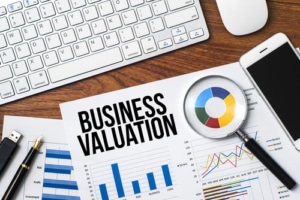Know the Value of Your Business Early On
 While we always advocate a professional valuation as one of the first steps in listing a business, if we had it our way, we’d have business owners do at least an informal evaluation years before even finding out business brokers exist.
While we always advocate a professional valuation as one of the first steps in listing a business, if we had it our way, we’d have business owners do at least an informal evaluation years before even finding out business brokers exist.
The reason is simple. The more you understand what your business is currently worth and what the value drivers are, the better you can have a goal to reach that can trigger a sales event. You won’t wander up to a broker with a ridiculous idea like, “I need X to retire, and so that’s what my business needs to sell for.” Because you found out the value of your business long before you decided to sell, and have monitored its growth in value, when you come to a broker, you’ll be able to say with confidence, “I think it’s worth X, and here are all the reasons why, which I’ve monitored for years.” We’ve seen it all in this business, but it’s not too often we’ve seen something like that, though we would welcome it!
Long-term Value Drivers
When we are getting businesses ready to sell, there are some short-term value drivers that can be pushed over a 6-12 month period to give one last push to your sale value. For example, if your sales are showing a nice upward trend ahead of your last full fiscal year, you’ve got an argument for a little more value.
But there are other value drivers that take a long time to develop, but have a correspondingly high value. Let’s talk about a few of those.
Company Culture
You cannot create or fix a company culture in a 6-12 month period. Like all things of value, it takes time to grow.
Culture grows from a set of beliefs about a company due to the actions of its team members and leadership. The generation coming into the workforce and rising into its leadership rank has certain conceptions about where they want to work and what they want to do. Remote work is one of the things they expect. Another is a culture they can enjoy and support (and brag about to their friends).
The rising generation would rather make less money and really believe in what they are doing than make more money in a culture they despise.
Culture is a value driver because it attracts and retains staff. A solid team is foundational to a well-run business and part of the valuation price. It’s not something that can be built overnight and the best ones don’t need a constantly supervising owner to maintain it.
Quality of Revenue
Every business is going to have different ways of generating new revenue and maintaining current revenue. But long before you think about selling, you should be looking to do three key things with your revenue:
- Diversify. If 80% of your revenue comes from one client, you have a fragile business that is not attractive to a buyer. Try to make sure that one client is not more than 15-20% of your revenue.
- Go recurring. Recurring subscription models are now normative in the B2C and B2B worlds. Take advantage of those norms and build in some recurring revenue models into your business. Buyers love recurring revenue. Bonus? Auto-renewals.
- Create contracts. Side-by-side with recurring revenue are contracts. These are also part of valuations and create peace of mind for buyers.
All revenue is not created equal. The higher your quality of revenue, the higher your possible valuation. You cannot upgrade the quality of your revenue in a 6-12 month timeframe.
Won and Lost Bets
One of the formational aspects of the entrepreneurial journey is trying stuff and failing. And trying stuff and winning. One of the conversations that will be part of a transaction will be a buyer asking a seller what possible things could be done to drive new revenue.
Believe it or not, a buyer would love to hear, “we tried this and it didn’t work, and here’s why.” This not only saves them some money going down one road a particular way, but it also gives them data to consider making a new assault on that road with a different approach.
The more data you have on things that you’ve tried, the more a buyer will be helped in brainstorming new ways to drive growth in the business. To say nothing of the fact that if you don’t take swings, you can’t hit homers. You only need to hit 3 out of every 10 to make it into the Hall of Fame. So take some bets and drive the value of your business now and in the future.
Even if you aren’t interested in selling for years, we can help you get a basic valuation for what you’ve got now and tell you what value drivers you need to leverage to get maximum value. Give us a call today!

 Another year, another set of unusual conditions for the world and business. But the
Another year, another set of unusual conditions for the world and business. But the  One of the drums we beat a lot in these articles, and have even more so
One of the drums we beat a lot in these articles, and have even more so  While we recently talked about
While we recently talked about  The incoming presidential administration has indicated its desire to tax certain earners’ capital gains at the same rate as their personal earnings. That has led to us getting more questions here at Apex about ways to reduce exposure to capital gains. One of these ways is called a deferred sales trust.
The incoming presidential administration has indicated its desire to tax certain earners’ capital gains at the same rate as their personal earnings. That has led to us getting more questions here at Apex about ways to reduce exposure to capital gains. One of these ways is called a deferred sales trust. The truth is that we are always looking to add to our inventory of listings. We want to give potential buyers as many choices as possible. It reassures them that they are choosing from the best of several opportunities, not just fighting for the scraps of a handful of listings. But that doesn’t mean we’ll take every listing that comes our way. In fact, sometimes we have to simply decline to list certain businesses. In this article we’ll discuss the three biggest reasons why we might not take your business listing.
The truth is that we are always looking to add to our inventory of listings. We want to give potential buyers as many choices as possible. It reassures them that they are choosing from the best of several opportunities, not just fighting for the scraps of a handful of listings. But that doesn’t mean we’ll take every listing that comes our way. In fact, sometimes we have to simply decline to list certain businesses. In this article we’ll discuss the three biggest reasons why we might not take your business listing. Unless you actually run an accountancy or bookkeeping business, accounting isn’t usually at the top of a business owner’s mind. But if you don’t understand your books, you don’t understand your business, and the choice between cash and accrual accounting is a choice about how you choose to view your business, so it’s an important difference to know about (and make an informed decision on).
Unless you actually run an accountancy or bookkeeping business, accounting isn’t usually at the top of a business owner’s mind. But if you don’t understand your books, you don’t understand your business, and the choice between cash and accrual accounting is a choice about how you choose to view your business, so it’s an important difference to know about (and make an informed decision on). In our
In our  You will find that even in the best-case scenarios, in which you have decided to sell the business at a premium to an outside buyer, that the franchisor has the right of first refusal built into the franchise agreement they have with you. Simply put, that means that all they have to do is match the price that you have under contract with a potential and you will have to sell to them instead.
You will find that even in the best-case scenarios, in which you have decided to sell the business at a premium to an outside buyer, that the franchisor has the right of first refusal built into the franchise agreement they have with you. Simply put, that means that all they have to do is match the price that you have under contract with a potential and you will have to sell to them instead.  While you might think that the main reason to get a valuation is to get a good idea of a possible sale price, there are actually lots of reasons to get one:
While you might think that the main reason to get a valuation is to get a good idea of a possible sale price, there are actually lots of reasons to get one: Whichever method of small business valuation you use, you’ll need to get a few things in order for the professional who is going to help you.
Whichever method of small business valuation you use, you’ll need to get a few things in order for the professional who is going to help you.